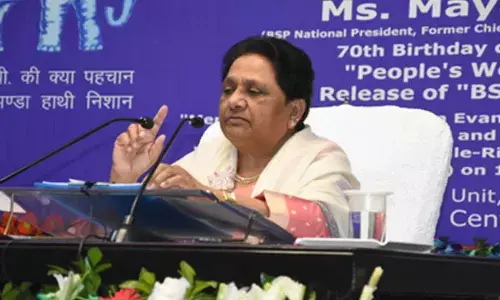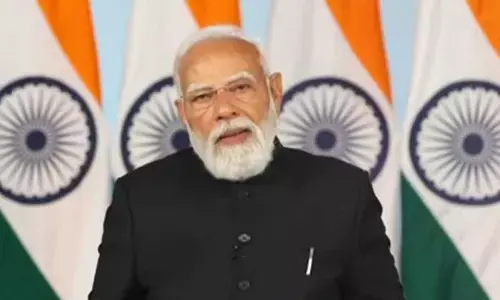Give big push to new technologies

China has recently successfully landed its spacecraft on Mars, created temperatures equal to that of the sun in their laboratories, and produced its own fighter jets instead of buying them from Rafael or other manufacturers.
The government should privatise the non-essential public sector undertakings like banks, airlines and oil companies and use this huge money to invest in new technologies that will increase our technological prowess and help us protect our sovereignty
China has recently successfully landed its spacecraft on Mars, created temperatures equal to that of the sun in their laboratories, and produced its own fighter jets instead of buying them from Rafael or other manufacturers. These achievements have been made possible because the Chinese government has made huge investments in the creation of new technologies.
Needless to say, we are lagging behind.
Our situation has become more desperate in this period of Covid. Our government is not even able to manage its current expenditures and it is having to borrow huge amounts to maintain the them. Although the Finance Minister has increased the capital expenditures by 35% to Rs 5.5 lakh crore in this financial year 2021-22; however, this amount is very small compared to the needs of investment in technologies.
The present value of market capitalisation of all the public sector undertakings (PSUs) is about Rs 20 lakh crore. This is about 4 times the total annual capital expenditures of the Union government at Rs 5.5 lakh crore. The government can raise about 4 times more money for these investments if the existing public sector undertakings are privatised.
Certain PSUs will continue to be necessary. For example, the State Bank of India manages the clearing houses in every district of the country. The Central Board of Secondary Education (CBSE) undertakes regulation of schools across the country. Such PSUs are providing "public goods" that are necessarily to be provided by the government. The regulation of schools cannot be left to the whims and fancies of the private sector. However, other PSUs are no longer essential. For example, banks other than the State Bank of India can be easily privatised without any loss to the economy. Private banks are able to provide the banking services provided by these public sector banks (PSBs). The possible profiteering and overcharging by private banks can be managed by stricter regulation by the Reserve Bank of India. The privatisation of PSBs will only heat up the competition among the banks and make them more efficient and force them to reduce the price of the services provided by them. Similarly, there is no need for the government to run Air India since other airline companies like Indigo and Spice Jet are able to provide domestic aviation service. Likewise, oil companies like Indian Oil can also be privatised since private oil companies like Reliance are able to provide the services.
The basic point is that there remains no case for the government to be present in areas where private sector is competent to provide the required services.
Thus, I reckon that out of the market capitalization of 20 lakh crores of all the PSUs in the country, about 1/4th or PSUs having market capitalisation of Rs 5 lakh crores may be retained to provide essential services like managing clearing houses and regulation of schools. The remaining PSUs having market capitalisation of Rs 15 lakh crores can be privatised. This amount would be about three times the present capital expenditures of the Union Government. This money can be utilised to invest in the creation of technologies so that we can compete with the global powers. We should not forget that the Patriot Missiles of United States were able to destroy Saddam Hussein's army in a few days because they were technologically more advanced.
Therefore, investment in technology will be absolutely essential if we have to protect the sovereignty of our country and also strengthen our economy. We should not forget that MNCs are remitting huge amounts as royalty payments because they are giving licenses of their patented technologies to Indian manufacturers. Fifty per cent of the price of Covid-19 vaccine is being paid to Astra Zeneca and other companies. We would not have had to pay this amount if we had invested in the creation of the Covid-19 vaccines.
The following areas desperately require more investment by the Government of India. First, Artificial Intelligence. Today IBM has a project named Watson which is helping doctors process the various information about a patient and suggest the future course of treatment. The Artificial Intelligence programmes process the huge of the information about a patient and provide the doctor with a number of alternative course of treatments. The doctor's work is reduced to taking the final call on the alternative treatments suggested by Artificial Intelligence. Thus, we must invest in Artificial Intelligence.
Secondly, investment is required in the Internet of Things (IOT). The security of offices, for example, can be better managed by computers. The computer can process the information about a possible theft and automatically direct the doors to be closed and send message to the police.
Third, the genetic modification is being done across the world. We have seen the possible negative impact of such experiments in the possible creation of the Covid-19 virus in China. But the same genetic technologies can also be used to create more beneficial technologies like improving yields of our crops and making them more resistant to diseases and heat; or genetically modifying potatoes to produce vitamins.
Fourth, we need to invest in promoting our conventional medical systems like Ayurveda, Unani and Homeopathy because Allopathy has its limits. Allopathy it is creating bacterial infections that are resistant to anti-biotics and that are increasing by the day. There is a need for the Government to promote research in alternate medical systems across the globe including, for example, African Tribal Medicines.
Fifth, Virgin Galactic is planning to launch a commercial spacecraft. Indian Space Research Organization has successfully launched a number of satellites of other countries on commercial basis. There is a need to establish a separate PSU to launch commercial spaceships and land spaceships on moon and mars. There are a large number of other areas where such investment in new technologies is needed. The government should therefore privatise the non-essential public sector undertakings like banks, airlines and oil companies and use this huge money to invest in new technologies that will increase our technological prowess and help us protect our sovereignty.
A possible counterargument may be that the Government should not renege form its responsibility of welfare of present employees of the PSUs. In think this argument is upside down. By privatizing existing PSUs, the employees of the present PSUs remain employed with the buyer of the PSUs. In addition, new employment will be created in the new PSUs. Thus, privatization will create employment, no reduce it.
(The author is former professor of
Economics at IIM, Bengaluru)
Heading
Content Area
Heading
Content Area
Heading
Content Area














